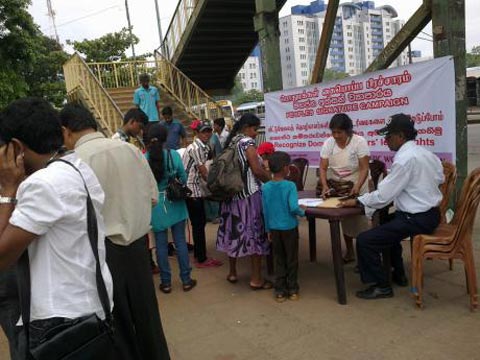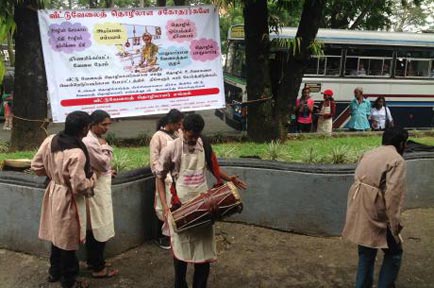Done being hapless
Domestic workers fight back against violence in the
aftermath of the Justice Abrew incident:
by Yasmin Gunaratnam
The Sri Lankan Domestic Workers Union, along with other trade union
and women's groups, organised a picket outside the Supreme Court on
Monday, July 6. The protesters demanded that action be taken against
Justice Sarath Abrew who is alleged to have raped and brutally attacked
a domestic worker at his home on or around the June 26. The woman's
injuries included a fractured skull. She was admitted into hospital as
an emergency.
If an attack like this had been in a public place it would be just as
horrific. That violence and degradation can happen in the home and
within a working relationship underscores the profound susceptibility of
women domestic workers. As The International Labour Organisation (ILO)
has recognised 'domestic workers, whether working in their home
countries or abroad, are vulnerable to many forms of abuse, harassment
and violence, in part because of the intimacy and isolation of the
workplace'.
|

Union members protesting and collecting signatures. Credit:
Sri Lankan Domestic Workers Union. |
In Sri Lanka, such experiences are tacitly acknowledged but can still
be trivialized, in similar ways to how domestic violence was culturally
accepted in Britain until the feminist campaigns of the 1970s and 80s .
'Sarath Abrew becomes boisterous again' is how one on-line newspaper
reported the case, referring to Abrew's ignoble record, "Four such
similar assaulting incidents were reported about this judge before. That
was against another domestic maid and three police officers." What is
likely to make a difference this time is that the allegations of
violence against Abrew have been taken up by the Domestic Workers Union
(DWU). The union has been able to mobilise support from fourteen other
civil society organisations and trade unions, including the
International Domestic Workers Federation and the Women's Political
Academy.
Therapeutic support
As well as organising Monday's picket, the groups have written to the
President, Maithripala Sirisena, demanding financial and therapeutic
support for the woman and calling for Abrew's immediate arrest and
sacking. "This brazen attack is an opportunity for the government to
send a clear message that violence against domestic workers won't be
tolerated", a spokeswoman for the DWU said. "Women domestic workers have
long been telling us about the abuse they have faced in homes, including
sexual violence. There are good stories too, about workers being treated
with respect, but we can't afford to leave it to chance. Only when
domestic workers have stronger legal rights will they be safe."
The vast majority of domestic workers in Sri Lanka are women with low
levels of education. The feminization of housework means that domestic
work is considered low skilled, not 'real work'. It is subject to the
idiosyncratic standards and whims of each household, where varying
degrees of docility and acquiesce are encouraged. I have seen domestic
workers in Sri Lankan homes managed through the smallest of gestures -
the nod of a head, a glance, the movement of fingertips.
This whole sector of employment is characterised by paternalistic
informality. Contracts for domestic work are mainly verbal and workers
have limited legal rights.
Domestic work does not come under the parameters of national wage
fixing mechanisms and the gaps between local laws and international
standards mean that access to social security and maternity benefits are
at best tenuous. A report, 'Decent Work for Domestic Workers', produced
by the independent think tank Verité Research in March this year,
recommended a comprehensive overhaul of policy and law to improve the
rights and protection of domestic workers in Sri Lanka: an expansive
interpretation of existing legislation, amending existing laws and
introducing new laws.
Inequallities
For those of us living in the global North it can be relatively easy
to feel removed from the seemingly archaic politics of domestic work in
places like Sri Lanka. I have only recently become aware of the extent
to which the anomalous persistence of domestic work in its diverse forms
- whether through the global care chain or through home based cleaning,
au pairing or tuition - plays an increasingly vital part in how
inequalities are maintained across the globe.
Using figures from the International Labour Organisation, Verité
Research has highlighted a worldwide increase in demand for domestic
workers. Verité estimates that one in every thirteen women in the labour
force will be a domestic worker. To use statistically crude imagery, on
a packed London double decker bus, which at full capacity takes 84
people, you would be rubbing shoulders with at least six women domestic
workers.
The power to capture and consume the time of others is what maintains
and fixes modern class differences and the accumulation of status, the
sociologist Bev Skeggs has argued recently. Skeggs cites a 2013 survey
by the elite estate agent Wetherell that found that there are more
domestic workers in the London area than there were 200 years ago.
|

Union members campaigning. Credit: Domestic Workers’ Union. |
In Mayfair 90 per cent of the 4,500 people who own houses, and 80 per
cent of those with flats, had their own domestic worker in 2013. In
1790, 48 servants lived in Mayfair and worked for 1,500 residents.
Wetherell observe, "wherever the multiple between the wages of the rich
and the poor grows, so does the number of servants."
Moral health of society
The connection that the Domestic Workers Union is making in Sri Lanka
between the treatment of domestic workers and the moral health of a
society is an important argument. In her rousing Birkbeck Annual Law
Lecture in 2013, the scholar Angela Davis suggested that in the
twentieth century, the situation of black women domestic workers in
North America approximated that found in slavery. For Davis, the "very
concept of freedom must have been first imagined by slaves".
Davis believes that domestic workers played a crucial, but
historically unrecognised role, in the emergence of the Black Freedom
and Civil Rights movements through such actions as the 1955 Montgomery
bus boycott.
Davis quotes Fanny Lou Hamer, a leader of the Student Nonviolent
Coordinating Committee (SNCC) the Mississippi Freedom Democratic Party,
"all my life, I have been sick and tired", Hamer said, "Now I am sick
and tired of being sick and tired."
Isn't it about time that we all became sick and tired of the
exploitation of the vulnerability of all those who live and work in our
homes?
(Yasmin Gunaratnam is a Senior Lecturer in
Sociology at Goldsmiths College and is a member of the Media Diversified
writers Collective. Her book Death and the Migrant was published by
Bloomsbury Academic in 2013 and this article was published in 50-50
Inclusive Democracy) |

